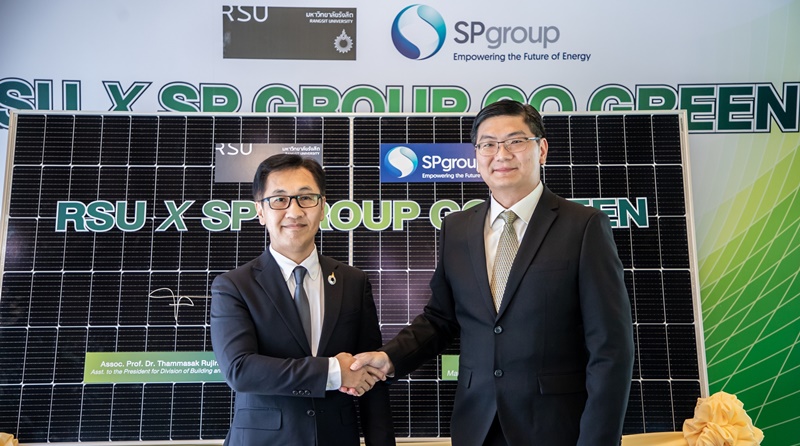SP Group’s Integrated Energy Solutions to Power Rangsit University’s Green Energy Transformation
Rangsit University (RSU) is set for green transformation at its main campus in Mueang Pathum Thani District, Greater Bangkok. SP Group (SP), a utilities group and sustainable energy solutions provider in Singapore and the Asia Pacific, is partnering RSU, a leading private university in Thailand, to transform this space into a smart, low-carbon campus. SP will deploy a comprehensive suite of integrated and sustainable energy solutions across the campus. These include solar photovoltaic (PV) deployment with a centralised energy management and storage system, and harnessing SP’s GETTM (Green Energy Tech) – a smart building intelligence system that maximises building energy efficiency and enhances occupant comfort. When completed in 2024, these solutions will enable the university to green up to 21 per cent of its total energy consumption and lower its carbon emissions by 1,400 tonnes annually.
To further this green partnership, SP and RSU will conduct a feasibility study to implement more integrated sustainable energy solutions across the campus. These include a district cooling system to provide energy-efficient air-conditioning, increasing the scale of solar PV and energy storage systems deployment, and further expanding the integration of the GETTM suite of digital energy management tools that leverage smart insights to optimise energy efficiency, enhance occupant experience, and advance sustainability efforts.
As part of the partnership, SP will install a 2-Megawatt Peak (MWp) of rooftop solar photovoltaic (PV) across nine buildings on the campus, and a floating solar PV system on one of the university’s ponds. To maximise the accessibility of solar energy across the campus, SP will also be installing an Energy Storage System (ESS) that enables on-demand supply of solar energy. The combined solar PV system is expected to generate 2,749 Megawatt-hour annually.
When the system is completed, RSU’s Facility and Environmental Management Office (Building 13) will be 100 per cent powered by solar energy and will be the first building in a Thailand university campus to aim for net-zero status.
SP will also expand its deployment of GETTM Control, a micro-climate building intelligence system that maximises energy-efficiency of the building’s air-conditioning, to two additional buildings – Building 12/1 and Building 11 – following a successful pilot deployment. Over a two-month period, the pilot helped to achieve 40 per cent energy savings for two levels on building 12/1 and Building 11 and improved occupant comfort by 14 per cent. The solution utilises Artificial Intelligence and Internet of Things to optimise and regulate air-conditioning, by taking into consideration factors like occupancy and ambient weather conditions to optimise air-flow to evenly cool areas.
“Buildings like offices, factories, hospitals and university campuses have unique operational and energy demands. Our expertise in delivering customised, end-to-end integrated energy services will enable buildings to maximise the benefits of diverse energy resources, optimise efficiency and achieve significant environmental benefits including reduction of carbon emissions. We are very pleased to partner Rangsit University on its ambitious sustainability journey, and look forward to joining hands with more developments to drive the decarbonisation of Thailand’s urban built environment,” said Mr. Brandon Chia, Managing Director of Southeast Asia & Australia, SP Group.
“Climate change affects everyone, including educational institutions like us. There is an urgent need to enhance our buildings’ energy efficiency and develop sustainability goals to support Thailand’s targets of reducing the amount of greenhouse gas emissions,” said Associate Professor Dr. Thammasak Rujirayanyong, Assistant to the President for Building and Environment, Rangsit University. “We selected SP Group based on the efficacy of their track record, and they have impressed with their commitment and thoroughness. I hope that RSU’s successful implementation of SP’s integrated energy solutions will serve as an example for other education institutions to follow suit.”
Rangsit University has set a target to become a smart, low carbon campus as part of its commitment to environmental stewardship and social responsibility, including carbon neutrality, sustainable infrastructure, and sustainable transportation.
SP Group has been supporting the green energy transition of customers in Thailand since 2022. It has over 40MWp of solar projects in operation and under construction; and secured a pipeline of over 100MWp of other solar projects across Thailand. Key partners include Malee Group, Asia Composite Material, Compact International and SAICO, who have leveraged SP’s strong engineering expertise, regional experience, and operational excellence to embark on their green energy transition.
SP recently announced its first district cooling project in Thailand, at Government Complex Centre Zone C, as part of its joint venture with Banpu NEXT. When completed in 2024, the district cooling system will operate a total cooling capacity of up to 14,000 Refrigeration Tons (RT) and enable the facility to save approximately 40 million baht (USD $1.12 million) per year on electricity costs, achieve 20 per cent in energy savings and reduce carbon emissions by up to 3,000 tonnes annually.



